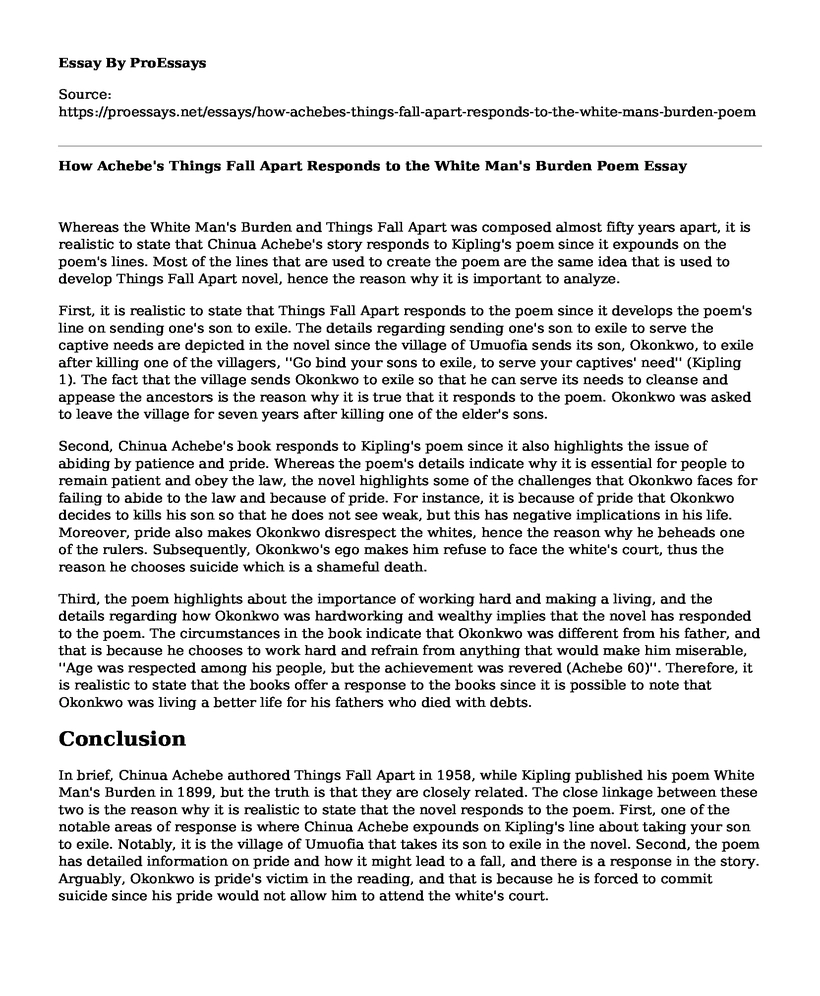Whereas the White Man's Burden and Things Fall Apart was composed almost fifty years apart, it is realistic to state that Chinua Achebe's story responds to Kipling's poem since it expounds on the poem's lines. Most of the lines that are used to create the poem are the same idea that is used to develop Things Fall Apart novel, hence the reason why it is important to analyze.
First, it is realistic to state that Things Fall Apart responds to the poem since it develops the poem's line on sending one's son to exile. The details regarding sending one's son to exile to serve the captive needs are depicted in the novel since the village of Umuofia sends its son, Okonkwo, to exile after killing one of the villagers, ''Go bind your sons to exile, to serve your captives' need'' (Kipling 1). The fact that the village sends Okonkwo to exile so that he can serve its needs to cleanse and appease the ancestors is the reason why it is true that it responds to the poem. Okonkwo was asked to leave the village for seven years after killing one of the elder's sons.
Second, Chinua Achebe's book responds to Kipling's poem since it also highlights the issue of abiding by patience and pride. Whereas the poem's details indicate why it is essential for people to remain patient and obey the law, the novel highlights some of the challenges that Okonkwo faces for failing to abide to the law and because of pride. For instance, it is because of pride that Okonkwo decides to kills his son so that he does not see weak, but this has negative implications in his life. Moreover, pride also makes Okonkwo disrespect the whites, hence the reason why he beheads one of the rulers. Subsequently, Okonkwo's ego makes him refuse to face the white's court, thus the reason he chooses suicide which is a shameful death.
Third, the poem highlights about the importance of working hard and making a living, and the details regarding how Okonkwo was hardworking and wealthy implies that the novel has responded to the poem. The circumstances in the book indicate that Okonkwo was different from his father, and that is because he chooses to work hard and refrain from anything that would make him miserable, ''Age was respected among his people, but the achievement was revered (Achebe 60)''. Therefore, it is realistic to state that the books offer a response to the books since it is possible to note that Okonkwo was living a better life for his fathers who died with debts.
Conclusion
In brief, Chinua Achebe authored Things Fall Apart in 1958, while Kipling published his poem White Man's Burden in 1899, but the truth is that they are closely related. The close linkage between these two is the reason why it is realistic to state that the novel responds to the poem. First, one of the notable areas of response is where Chinua Achebe expounds on Kipling's line about taking your son to exile. Notably, it is the village of Umuofia that takes its son to exile in the novel. Second, the poem has detailed information on pride and how it might lead to a fall, and there is a response in the story. Arguably, Okonkwo is pride's victim in the reading, and that is because he is forced to commit suicide since his pride would not allow him to attend the white's court.
Works Cited
Achebe, Chinua. Things Fall Apart. Chicago: Heinemann, 1996.
Kipling, Rudyard. The White Man's Burden. New York: Doubleday and McClure Company, 1899.
Cite this page
How Achebe's Things Fall Apart Responds to the White Man's Burden Poem. (2022, Aug 15). Retrieved from https://proessays.net/essays/how-achebes-things-fall-apart-responds-to-the-white-mans-burden-poem
If you are the original author of this essay and no longer wish to have it published on the ProEssays website, please click below to request its removal:
- The Poem in the Park Essay
- Critical Essay on Theme of Conflict in Hamlet
- "The Yellow Wallpaper" as an Example of a Gothic Allergory Essay
- Exquisite Corpse Literacy Narrative Essay
- The Round House by Louise Erdrich Essay Example
- Essay Example on Robert Frost's The Pasture: Rebirth in the Spring
- Book Review Sample on Rappaccini's Daughter: Complete Spectrum of Human Morality







